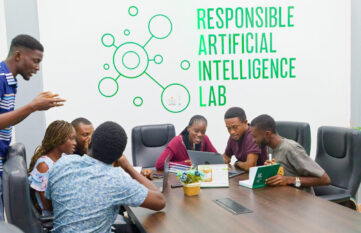AI Action Summit in Paris: Opportunity or risk—the two sides of artificial intelligence

The opportunities that artificial intelligence (AI) offer for sustainable development are enormous: the World Economic Forum predicts that AI will create up to 50 million new jobs by 2030; AI is transforming climate prediction models and could contribute to the fight against climate change—for example, using image recognition to help farmers identify and combat crop diseases at an early stage.
However, almost half of all advanced AI technologies are being developed in the US, China or the UK. The AI Action Summit in Paris on 10 and 11 February 2025 therefore focused on the opportunities offered by AI—and how Europe can best position itself in the current competition for artificial intelligence between the US here and China there.
It is also important to be aware of the dangers: deepfakes, i.e. deceptively realistic faked images and videos, as well as fake news are on the rise because of AI. The high energy consumption of AI worsens the carbon footprint—and developing countries risk being left even further behind. In short, will AI make the world more equitable—or even more unjust? This is where the German development cooperation comes in.
Dr. Bärbel Kofler: “AI not just for a privileged few”
At the side event organised jointly with UNDP, the BMZ therefore raised the question of what a fair AI could look like, one that serves the well-being of all people. Dr. Bärbel Kofler, Parliamentary State Secretary at the BMZ, emphasised in her opening speech entitled ‘Towards the Hamburg Declaration on Responsible AI for the SDGs’:

Dr. Bärbel Kofler, Parliamentary State Secretary, BMZ © Steffen Kugler
We are not faced with the question of whether AI will influence our future, but how: Will it reinforce divides—or will it be a force for good? AI must be a common project for all of humanity—not just for a privileged few. That’s why we want to shape the future of AI on equal footing with our partners from the Global South: responsibly, inclusively and sustainably to serve our shared development goals.
Global cooperation in response: the Hamburg Declaration
The event in Paris was a further step towards the ‘Hamburg Declaration on Responsible AI for the SDGs’, which will be adopted at the Hamburg Sustainability Conference in June 2025. Supported by a broad alliance of governments, the private sector, academia and civil society, the declaration will send a clear message: AI is not the privilege of a few tech giants or states, but a shared global resource for the future that should be equally accessible to all.
One area of focus is linguistic diversity in AI development. Currently, most AI models are trained almost exclusively in English or Mandarin—missing out on thousands of languages and millions of people.
To address this, the AI for Development Funders Collaborative has announced an investment of 10 million US dollars—including funding from the Gates Foundation and the governments of the UK and Canada. The aim: greater use of African languages, in particular, in AI development, so that 1.3 billion people in Africa have better access to local AI innovations in areas such as agriculture, the public sector and climate protection.
BMZ Data Lab sets standards: successes in AI competition and hackathon on using AI for the common good
Innovative AI solutions from BMZ also received recognition. The Data Lab was represented in several ways: First, the AI application KIEZ (Artificial Intelligence for Development Cooperation) was nominated as one of eight presentations out of more than 500 applications in the ‘AI Efficiency’ competition. According to the test report, KIEZ promises to increase staff efficiency by up to 25%, depending on the area of work. The Data Lab was invited to present KIEZ at the Business Days of the Paris AI Summit—a great success!
In addition, the BMZ Data Lab participated in the ‘GenAI for Public Good’ hackathon last week, together with the BMI and the ITZ-Bund. In a short amount of time, the team created an AI-based solution that helps to quickly and securely decide whether documents contain sensitive information. This makes the publication process more efficient and secure. As a result, more information can be shared—for the benefit of citizens. Overall, the AI Action Summit proved that digital innovation in public administration is not a vision of the future, but can be realised and shaped today.







